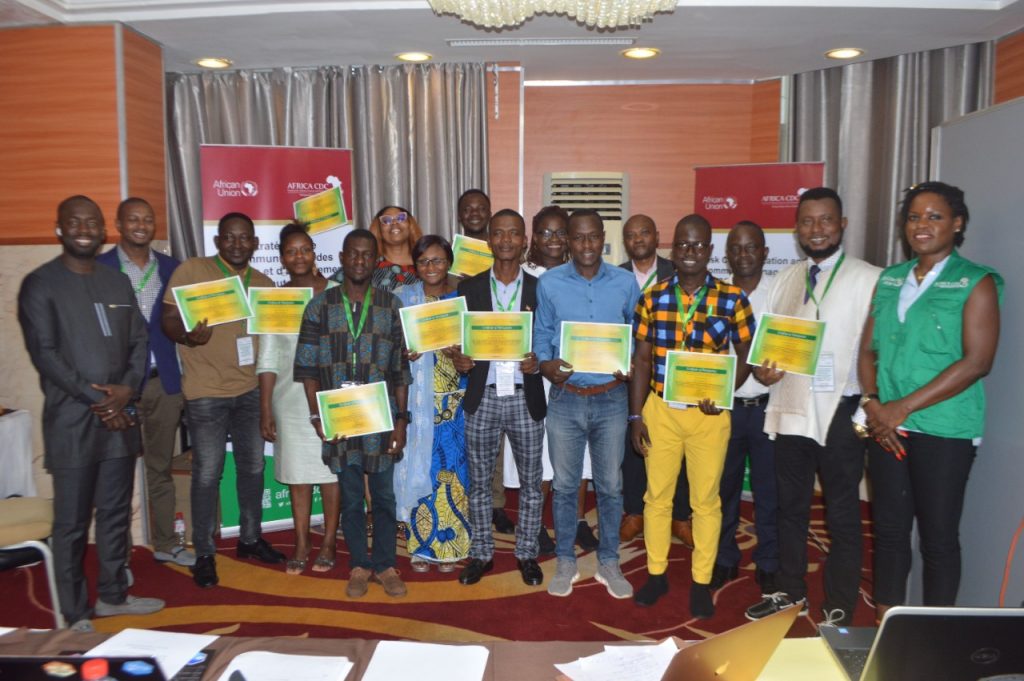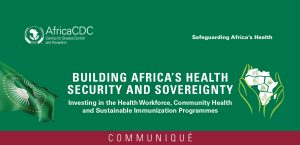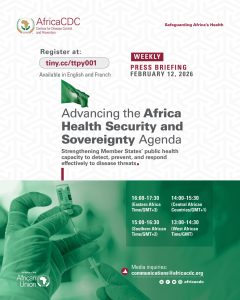Cotonou, Benin | 7th October 2022 – Media professionals from public broadcasting entities in the West African region have been trained on strategies to fight infodemic and proper use of health data in reporting. The training took place from 4 – 6 October 2022 in Cotonou, the Republic of Benin, bringing together 16 health reporters and editors.
In cognizant that media – print, radio, online media, and television – plays an essential role in building understanding about the challenges people in different situations and contexts can and do face during a pandemic, including COVID-19, the training aimed at creating a pool of health reporters who can facilitate conversations on how best to report on COVID-19, future pandemics, and other public health-related topics.
“You, journalists, play an important role in helping shape perceptions, attitudes, values, and behaviours in society. It is, therefore, important to strengthen your capacity and knowledge in COVID-19 vaccination and give you the tools to communicate better for the community. Accurate media coverage based on facts and scientific evidence is important for changing communities’ behaviours. Your role has never been more important”, Mrs Liliane Bilogho Ndong Nang, Advocacy and Communication Officer, Africa CDC, commented during the training.
Since the start of the global COVID-19 immunization effort, there has been the proliferation of false information on the internet and social media aimed at creating fear, and hesitancy in vaccine uptake and down the efforts of the response. The COVID-19 “infodemic” has highlighted the way in which people need information while also feeling overwhelmed by it.
The 3-day workshop also built the data skills of journalists to develop stories related to public health and COVID-19. The training provided a detailed overview of public health data sources, including Africa CDC datasets and built skills related to data use in reporting. Key sessions included: getting to know your sources, developing a rich public health data story, engaging and making sense of public health data and interpretation, analyzing and visualizing data. Participants appreciated that greater collaboration among public health stakeholders is key in addressing health-related miscommunication and disinformation.
“The training has equipped me with skills in data reporting, sourcing for trusted data sources, and how we can engage our communities to better respond to misinformation, disinformation, and rumours. I thank the Africa CDC and the trainers for organizing this important training”. Martha Okere, a reporter at 92.3 Nigeria Info FM, added that she now feels confident and capable of reporting on COVID-19 and other public health diseases that may break out in the future.
The 16 participants will constitute the second network of journalists specialized in reporting on COVID-19 and public health emergencies. This network is part of the continental response to COVID-19.
Media Contacts:
Mr Kelvin Gichia – Communication Officer, Africa CDC, GichiaK@africa-union.org
Mrs Liliane Bilogho – Advocacy and Communication Officer, Africa CDC, nangl@africa-union.org
About the Africa CDC: The Africa CDC’s mission is to strengthen Africa’s public health institution’s capacities, capabilities, and partnerships to detect and respond quickly and effectively to disease threats and outbreaks based on science, policy, and data-driven interventions and programmes. Learn more at: https://africacdc.org
About the African Union: The African Union spearheads Africa’s development and integration in close collaboration with African Union Member States, the Regional Economic Communities, and African citizens. AU Vision: accelerating progress towards an integrated, prosperous and inclusive Africa, at peace with itself, playing a dynamic role in the continental and global arena, effectively driven by an accountable, efficient and responsive Commission. Learn more at: https://au.int/en/






